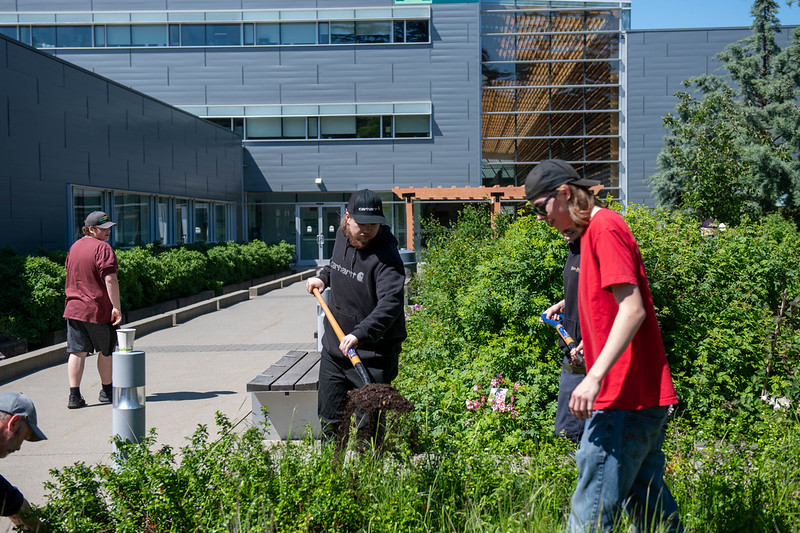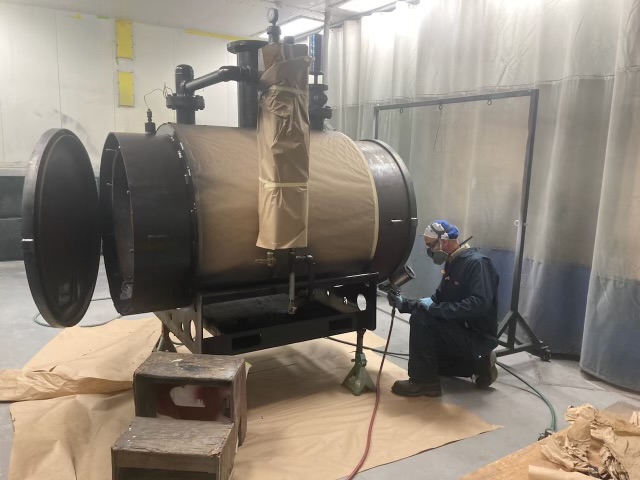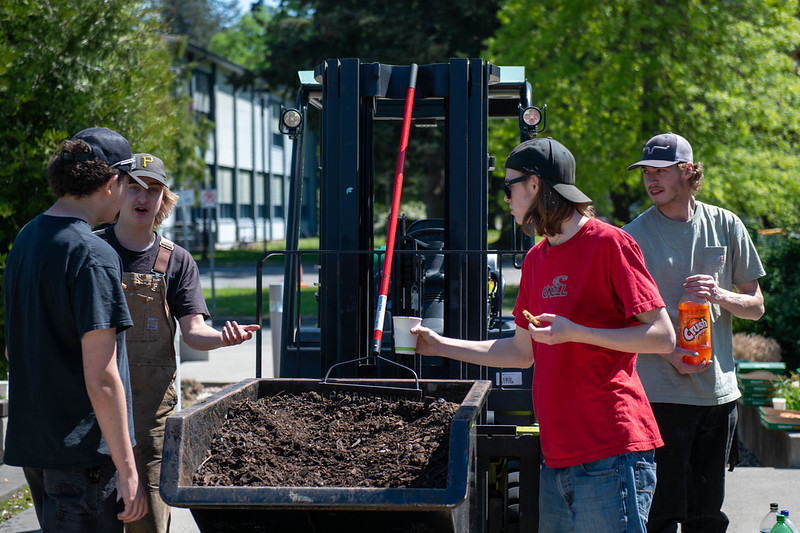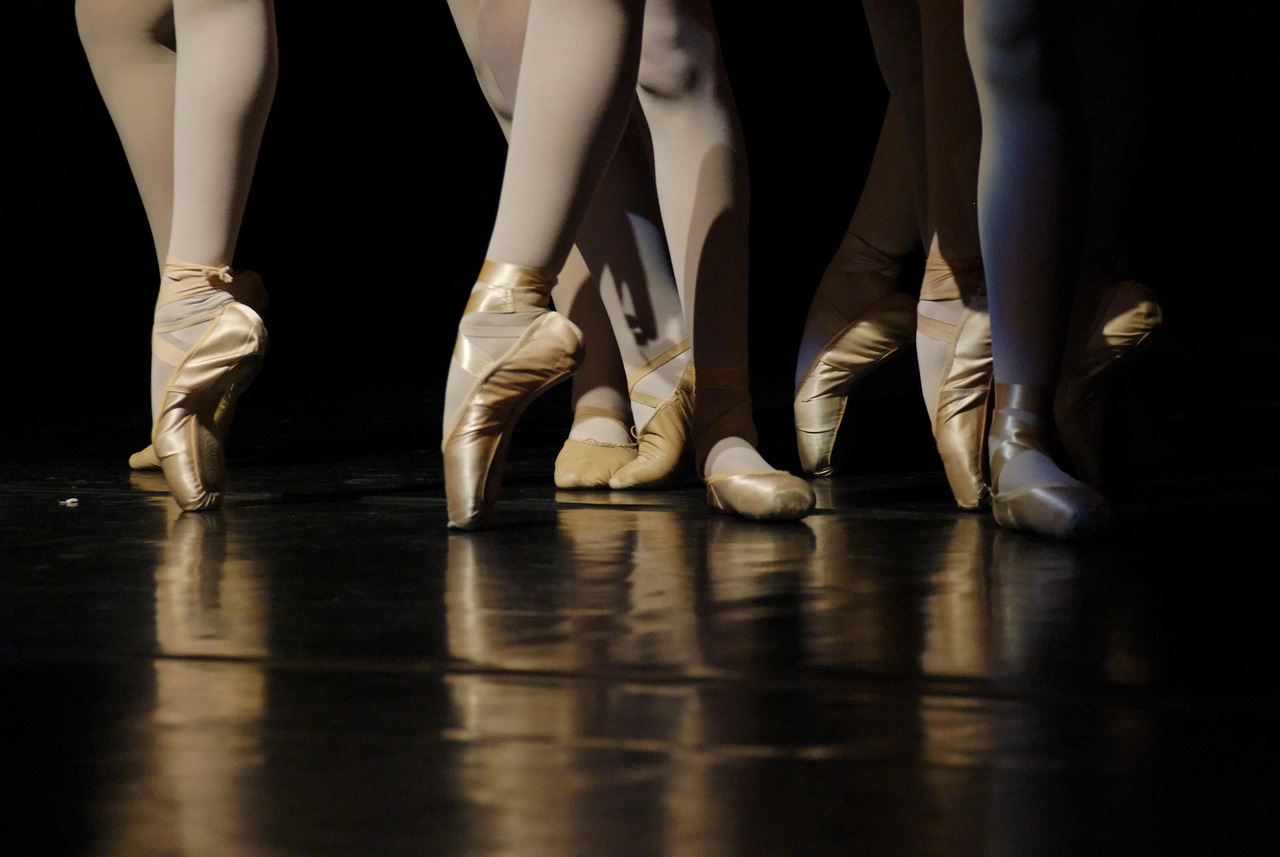Collaborative project brings welders to Shakespeare Reconciliation Garden

Spring tending of the Shakespeare Reconciliation Garden on the UFV Chilliwack campus saw science and welding mix with planting and mulching.
On May 10, UFV welding instructor Matt Olafson brought a group of students to the garden. For a year-end project, they built a furnace that turns reclaimed wood from the carpentry program into biochar, a carbon-rich substance that counts agriculture among its many uses.
The students trucked over a bin of biochar, which they mixed with compost and stirred into the soil. Afterwards, they listened to a reading of ‘O for a Muse of Fire’ from Shakespeare’s Henry V, expertly delivered by Dean of Applied & Technical Studies Teresa Kisilevich, and they heard the Indigenous story of ‘How Beaver Stole Fire from the Pines,’ delivered by teaching colleague Chris Monkman.

Alan Reid, associate professor of biology, addressed the students, as did Olafson’s old welding instructor, Roger Moren.
“They got a multi-faceted presentation from the university to end their year,” Olafson says.
The biochar furnace, which took around three weeks to build, cooks wood without oxygen. Pieces are loaded into an inner chamber that’s tightly sealed. It resides within a larger chamber that’s heated with a conventional fire. As the outer chamber heats up, a process called carbonization begins.
“First you get steam as the water comes out of the wood,” Olafson explains. “Then you get the natural gases like hydrogen and methane. We capture those and re-inject them into the process, and now our fire box is being fueled by the natural gases from the wood.”
Acetic and formic acids are other byproducts that are collected. Both have uses in organic farming — when mixed with water, formic acid is a potent pesticide, and Olafson describes acetic acid as “adrenaline for plants.”
From start to finish, the process takes eight hours and produces zero harmful emissions. The carbon is retained in the wood, which emerges in coal black chunks that are broken into smaller pieces with a shredder that Olafson and his crew also built. He likens the final products to sponges, each piece with more surface area than a football field because of carbon’s crystalline nature.
“There’s a lot of inner channels where beneficial microbiologies and plant inoculants can take root,” Olafson says. “You put it in the dirt and the carbon is safe there for thousands of years, which is better than putting it into the atmosphere to cook ourselves.”
Olafson, a self-described audiophile, named the furnace Cracklin’ Rosie after Neil Diamond’s hit song from 1970.
“When you light it up, it crackles a lot,” he laughs.
Olafson has been involved with the Shakespeare Reconciliation Garden for a few years, since getting to know UFV Curator Teresa Carlson. Carlson is involved with the garden along with faculty coordinators Reid and Dr. Melissa Walter (associate English professor), Betty Peters (Indigenous Student Centre director), Shirley Hardman (Associate Vice-President, Indigenous) and many others.

Olafson and his students have a track record of building interesting things. Last year they created a compactor to handle waste generated by the agriculture sector. Pierce Stoeckly, UFV Trades and Technology program technician, had a hand in that project and this year he pitched Olafson the idea for the biochar furnace. Stoeckly lives in Agassiz and is interested in biochar.
“My wife and I are developing a permaculture food forest on our land,” he says. “I came across some research done on adding biochar to soil to enhance its ability to hold moisture during longer and hotter summers, as well as increase microbial life. I consider myself a layman scientist so when I read something that raises my curiosity, I must try it. Working at UFV has allowed me to pursue these interests, and Matt and his welding students are great enablers.
“For this I am forever grateful.”
Olafson hopes the project and the experience at the garden left his students with smiles and stories.
“I hope they come away from this seeing a bigger picture,” he muses. “We welders spend a lot of time in the dark, talking to ourselves, and there’s a whole wide world out there.”
Click here for more on the Shakespeare Reconciliation Garden, and click here to get involved.





